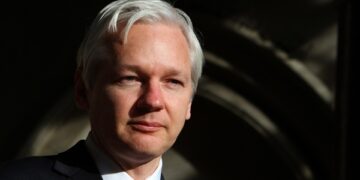WikiLeaks founder Julian Assange has been freed from prison in the United Kingdom, after he agreed to plead guilty to a single charge of breaching the espionage law in the United States. He is travelling home to Australia after regaining his freedom.
Assange, 52, will plead guilty to one count of conspiracy to obtain and disclose classified US national defence documents, according to a filing in the US District Court for the Northern Mariana Islands.
He was freed from the UK prison on Monday morning after spending 62 months. A High Court in London granted him bail and was released at Stansted airport on Monday afternoon, where he boarded a plane and departed the UK.
“This is the result of a global campaign that spanned grass-roots organisers, press freedom campaigners, legislators and leaders from across the political spectrum, all the way to the United Nations,” WikiLeaks said in a statement on X.
“This created the space for a long period of negotiations with the US Department of Justice, leading to a deal that has not yet been formally finalised. We will provide more information as soon as possible.”
The charges Assange is anticipated to plead guilty to as part of a US deal, and for which he will be sentenced to time served, are drawn from the 1917 Espionage Act, for “conspiring to unlawfully obtain and disseminate classified information related to the national defense of the United States.”
Although the WikiLeaks founder is expected to walk free from the US district court in Saipan after Wednesday’s hearing, the Espionage Act will still hang over the heads of journalists reporting on national security issues, not just in the US, according to the Guardian.
In 2010, WikiLeaks released hundreds of thousands of classified US military documents on Washington’s wars in Afghanistan and Iraq. The revelations WikiLeaks published brought to light possible human rights abuses by the US military in those wars, among other things. They were published by several news organisations on the grounds there was a strong public interest in those secrets being brought to light.
Officials in the US had alleged that Assange goaded Manning into obtaining thousands of pages of unfiltered US diplomatic cables.
The cables were not only embarrassing but more importantly potentially endangered confidential sources. Many contained top secret information regarding Iraq war-related activity reports and information related to detainees held at Guantanamo Bay.
The trove of more than 700,000 documents included diplomatic cables and battlefield accounts such as a 2007 video of a US Apache helicopter firing at suspected insurgents in Iraq, killing a dozen people including two Reuters news staff. That video was released in 2010.
“WikiLeaks published groundbreaking stories of government corruption and human rights abuses, holding the powerful accountable for their actions. As editor-in-chief, Julian paid severely for these principles, and for the people’s right to know,” WikiLeaks said on X.
MR Assange’s wife, Stella, said she was “elated” and it was “incredible” that her husband was set to be freed.
“I’m just elated,” she said in a video shared by Al Jazeera on Tuesday. “He will be a free man once it has been signed off by the judge and that will happen sometime tomorrow.”
In February, the government of Australia made an official request for the US to drop charges against Mr Assange and President Joe Biden said he would consider it. At the time, the Australian government said Mr Assange’s case had “dragged on for too long”.
Australian Prime Minister Anthony Albanese said on Tuesday, he wanted Mr. Assange back in Australia as soon as possible. “Regardless of the views that people have about Mr Assange [and] his activities, the case has dragged on for too long”.


































